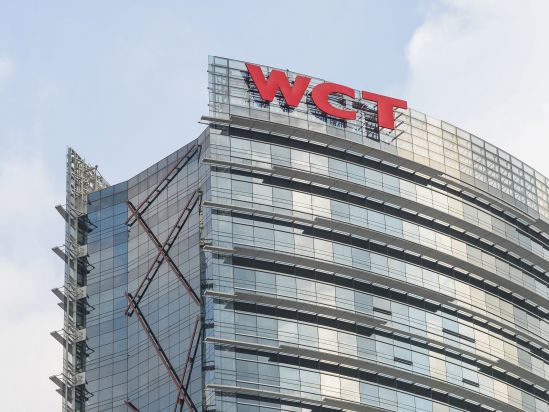PETALING JAYA, Wednesday 26 February 2020 - WCT Holdings Berhad (“WCT” or “the Group), a leading engineering and construction as well as property company, recorded a revenue of RM461 million for its fourth quarter ended 31 December 2019 as compared to RM701 million in the preceding year’s corresponding quarter. The net profit attributable to equity holders is RM12 million, recording an increase from RM3 million1 registered in the preceding year’s corresponding quarter.
The Group’s Engineering and Construction Division accounts for 57% of the Group’s consolidated revenue, while the Property Development and Property Investment & Management segments, contributed 32% and 11% to the Group’s consolidated revenue.
For the financial year ended 31 December 2019, the Group recorded lower revenue of RM1,794 million as compared to RM2,297 million recorded in the preceding year and the net profit attributable to equity holders for the year stood at RM89 million, a decrease of RM18 million from the preceding year’s profit of RM107 million.
The Group’s Engineering and Construction Division recorded an operating profit of RM99 million (FY2018:RM137 million) on the back of revenue of RM1,244 million (FY2018: RM1,846 million). The lower revenue and operating profit are mainly due to lower contribution as a result of certain recently completed projects and some of the existing projects are nearing completion.
Dato’ Lee Tuck Fook, Group Managing Director of WCT, said, “WCT’s overall performance was satisfactory considering the challenging macro-economic conditions throughout 2019. Our Engineering & Construction Division continues to be the Group’s main revenue contributor. We foresee this segment to continue contributing to the Group’s revenue in 2020 backed by its outstanding order book comprising a mix of civil and infrastructure works as well as building construction jobs. While we continue to focus on project execution to deliver a sustainable level of revenue and profits, we will also be pursuing new opportunities for construction jobs to replenish our order book.”
The Group’s Property Development Division recorded higher operating profit of RM95 million (FY 2018: RM42 million1) on the back of revenue of RM347 million (FY2018: RM 255 million). The higher revenue and operating profit were mainly attributed to the sale of undeveloped lands and property units in 2019. The sales of property units for the year amounted to RM322 million, which is higher compared to RM146 million in the preceding year.
The Property Investment and Management Division recorded an improvement in revenue at RM203 million for the financial year ended 31 December 2019 (FY2018: RM196 million). The higher revenue was mainly contributed by the improved occupancy level of Paradigm Mall in Johor Bahru and higher rental income from Bukit Tinggi Shopping Mall in Klang. The Division recorded a lower operating profit of RM 114 million (FY 2018: RM142 million), mainly because in 2018, there was higher fair value gain on investment properties and receipt of government facilitation funds for the infrastructure costs incurred for Paradigm Mall Johor Bahru.
Dato Lee added, “For 2020, our Property Development Division will continue to intensify its marketing and sales initiatives in an effort to improve sales of our existing unsold properties as well as divesting some of the idle undeveloped lands to improve our operating cash flows. Additionally, our retail malls under the Property Investment and Management Division are expected to maintain high levels of occupancy and contribute positively to the Group’s revenue and profit.”
The Group’s basic earnings per share for the financial year ended 31 December 2019 is recorded at 6.36 sen as compared to 7.65 sen1 recorded in the preceding corresponding year.
(Note: The profits for property development segment of the preceding year and preceding year corresponding quarter have been restated for purpose of comparative information, where land held for development and development properties would have achieved its intended use when a development project is launched, and hence, interest capitalisation should ceased at the point of project launch, consistent with IFRIC Agenda Decisions (March 2019) on IAS 23 : Borrowing Costs, which has been adopted by the Group with effect from 1 January 2019.)







